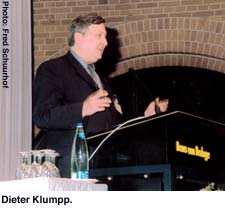Dieter Klumpp, Managing Director Alcatel SEL Foundation
INITI@TIVE D21
 The big difference between Germany and its neighbours concerning new technologies is that the neighbours ask: “how could we shape the future?”, whereas we in Germany ask: “what does the future bring?”. That sounds a bit defensive, and so it is regularly quite necessary to get initiatives on the way.
The big difference between Germany and its neighbours concerning new technologies is that the neighbours ask: “how could we shape the future?”, whereas we in Germany ask: “what does the future bring?”. That sounds a bit defensive, and so it is regularly quite necessary to get initiatives on the way.
Germany’s position in the international race is not as adequate as it should be. For example, the number of Internet nodes per inhabitant in 1998 was indexed less than 20, half of that in The Netherlands, and far behind the Scandinavian countries and, of course, the USA. Some company leaders including IBM, Hewlett Packard and Alcatel, decided to form an initiative called Initi@tive D21. A big jump is planned within a public-private-partnership: in two years time (1999-2001) a doubling of the number of Internet users (in % of the population) to 20%, catching up almost with the expectations of countries like France and the United Kingdom. The message to the government was: we are 10% of the world market in ICT, how could it then be possible to fall behind the European average?
D21 has the following objectives. First, politicians, business and industry, scientists and civil society groups should develop the best framework conditions for Germany’s way to the Information Society. (Germany doesn’t know centralisation, it consists of 16 Länder with independent authorities.) Second, government and public administration should become an example as pacemaking ICT users. This ‘e-ministration’ must be built up from the bottom in Germany. Third, education and qualification are the basic prerequisites for life, work and added value in the ‘digital economy’ within a knowledge society, and should be treated as such. And fourth, government and business should promote the general affordability of new ICT by enabling all actors to contribute to the framework.
A motivation campaign should lead to incorporation of more enterprises and institutions (currently over one hundred). A head office is being created in Berlin. A working programme can be found already on the Web (http://www.initiatived21.de), and quite recently a PR strategy was put into operation, with focus on ‘best practice’. The first D21 plenary conference was held 22 November in Berlin.
A Board of Management, aided by an advisory committee chaired by Chancellor Gerhard Schröder, runs five working groups, with sessions every two weeks:
- regulatory framework and access to Internet
- pacemaker’s role of government as ICT user
- education and qualification
- women and information technolog
- business startup campaign.
Members of the Board are recruited from business circles, secretarial support from several ministries. Education and Qualification receives considerable additional governmental support (about one billion DM/year). One of the most important strategies is the Business Startup Campaign, in view of the fact that whole Germany, with 80 million people, counts the same number of ICT-startups as in Brooklyn, New York.
The Federal Government also has an Action Programme running over four years, targeting on innovation and jobs for the information society. There is collaboration with D21 to seek ways via public-private partnership to speed up ICT use. Key areas of the Programme include:
- faster dissemination of ICT in all groups of the population
- ‘Internet for all’ (Access and Affordability)
- modernising training (eg, ‘44.000 German Schools to the Net’)
- stepping up research (eg, Terabit transmission, Man-Machine Interaction)
- new flexible ways of working (eg, telework)
- raising administrative efficiency (eg, e-ministration).
Of course, the USA leads the ICT field, and we as Europeans try to stay close behind. Over 40% of US households owned computers, 25% had Internet access, and 94,1% were connected by telephone at the end of 1998. However, the bright picture is clouded by data that show significant disparities continue between certain demographic groups and regions and, in many cases, the gap between these groups has grown over time (Falling Through the Net: Defining the Digital Divide by Larry Irving, National Telecommunications and Information Administration, U.S. Department of Commerce). A growing gap between the have’s and the have-not’s is certainly not what we want over here. We should learn from the US experience trying to avoid a digital divide from the outset.
